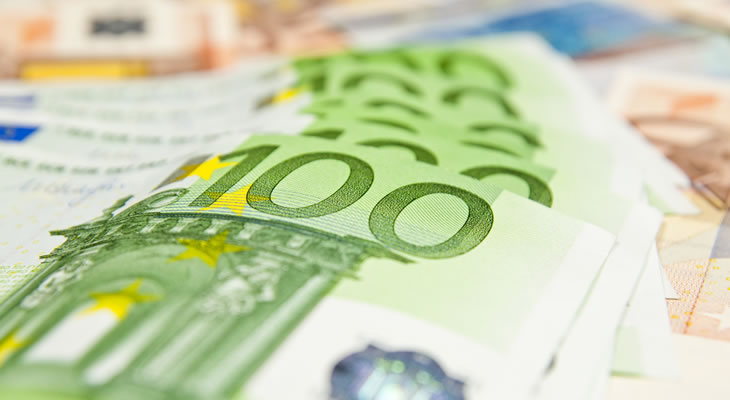Pound Sterling to Euro (GBP/EUR) Exchange Rate Jumps
Following the publication of the Bank of England’s (BoE) inflation report, the Pound Sterling to Euro (GBP/EUR) exchange rate returned to trading in the region of a seven-year high.
As the BoE implied that interest rates might be increased sooner than markets currently expect, the Pound advanced on the majority of its peers.
The Euro, meanwhile, was pressured lower by a less-than-impressive industrial production report for the Eurozone.
The Pound Sterling to Euro (GBP/EUR) exchange rate was trading in the region of 1.3533
Earlier…
GBP/EUR Exchange Rate Back Below 1.35
Hopes that Greece may resolve its debt situation with its creditors, coupled with concerns that today’s BoE inflation report will be dovish, saw the Pound slip slightly against the Euro.
However, the GBP/EUR pairing could recover losses if the BoE’s comments indicate that interest rates could still be raised in 2015.
The Pound Sterling to Euro (GBP/EUR) exchange rate is currently trading in the region of 1.3434
Earlier…
GBP/EUR Exchange Rate Surges 0.4%
Growing concerns that the Eurozone could be on the verge of losing one of its founding members saw the Pound Sterling to Euro (GBP/EUR) gain by more than 0.4% during the European session to achieve a high if 1.3536.
Any negative statements issued after today’s gathering of European finance ministers could drive the Pound higher still.
However, as the European session continued the Pound Sterling to Euro (GBP/EUR) exchange rate pared its daily gain to trade in the region of 1.3470
Earlier…
The Pound Sterling to Euro (GBP/EUR) exchange rate could push beyond a 7-year high if the Greek debt negotiations take a turn for the worse.
GBP/EUR Exchange Rate Supported by UK Data, Greek Talks
While influential economic reports for both the Eurozone and UK are in short supply today, the Pound continues to derive support from yesterday’s better-than-expected British data.
The level of industrial production in the UK was shown to have fallen by slightly more than projected in December month-on-month, but manufacturing production outperformed expectations, rising by 0.1% instead of falling the -0.1% anticipated.
The Pound Sterling to Euro (GBP/EUR) exchange rate brushed a low of 1.3458
November’s figure was also positively revised to a gain of 0.8%.
However, Markit Economist Chris Williamson did say of the industrial production slump; ‘A sharp drop in factory output in October is a timely reminder that policymakers cannot be complacent about the UK’s recent run of strong growth persisting into the new year. Expectations of when UK interest rate may start rising will most likely be pushed back with the news that the manufacturing economy is struggling once again, and that the economic upturn remains all too dependent on domestic spending.’
Later in the European session the National Institute of Economic and Social Research (NIESR) estimated that the UK economy expanded by 0.7% in the three months through January, more than most industry experts had foreseen.
Demand for the Euro was also seriously undermined as Germany adopted a hard-line stance on Greek debt.
Although Greek Prime Minister Alexis Tsipras presented a moderated proposal for adapting the nation’s obligations, German Finance Minister Wolfgang Schaeuble poured cold water over any hopes that the Eurozone’s largest economy will support changes to the original conditions of the Greek bailout.
The Pound Sterling to Euro (GBP/EUR) exchange rate achieved a high of 1.3493
Eurozone Finance Ministers are gathering today to discuss the situation.
If they veto any moderations to Greece’s debt, the odds of the nation leaving the Eurozone will rise and the Euro could fall.
Pound Sterling to Euro (GBP/EUR) Exchange Rate Forecast
Tomorrow a number of factors could initiate Pound Sterling to Euro (GBP/EUR) exchange rate volatility.
Early in the European session investors will be focusing on the publication of January’s final Consumer Price Index for Germany.
The rate of inflation in the Eurozone’s largest economy is expected to hold at previous estimates, so any revisions could cause Euro movement.
The Eurozone’s Industrial Production report for December will also be of interest.
Economists have forecast that industrial production increased by 0.2% on a seasonally adjusted month-on-month basis.
However, as Germany’s recent industrial production report seriously missed forecasts, there is a chance that the figure for the Eurozone as a whole will also fall short.
The day’s main cause of GBP/EUR movement is likely to be the publication of the Bank of England’s Quarterly Inflation Report.
If the central bank adopts a comparatively hawkish tone with regards to the UK’s inflation outlook, it would leave the door open for a BoE interest rate increase in 2014 and could push the Pound to fresh highs.
The Pound Sterling to Euro (GBP/EUR) exchange rate is currently trading in the region of 1.3485
The Euro to Pound Sterling (EUR/GBP) exchange rate is currently trading in the region of 0.7415
The Pound Sterling to US Dollar (GBP/USD) exchange rate is currently trending in the region of 1.5262
The US Dollar to Pound Sterling (USD/GBP) exchange rate is trading in the region of 0.6549

